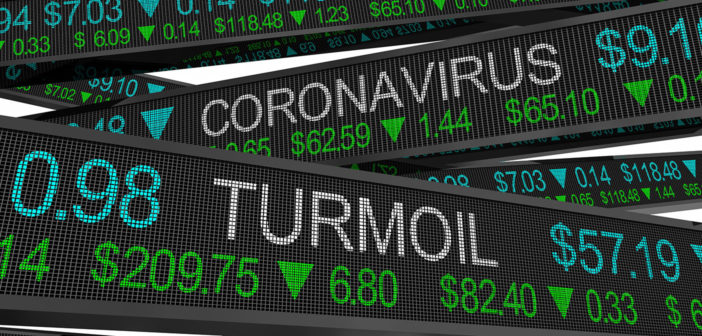As I write this late on Sunday night, March 22, the stock market, as measured by the S&P 500* has fallen 990 points since its February 19 high of 3993. That makes for a 34.27% decline in approximately three weeks. I’m not going to sugar-coat this: the actions of local governments to shut down business has drastically impacted on our economy. I estimate there is a chance that by the time this article is printed, we may see the number of Americans filing for unemployment explode past 20 million, as small and large businesses alike lay off staff in an attempt to keep their businesses running. I am hopeful that the House of Representatives and the Senate have been able to put politics aside and pass meaningful economic stimulus to help Americans who are most vulnerable to the government-imposed shutdown of multiple industries. I truly hope that these measures will help save lives, and I believe they will.
I have been on the phone 12-15 hours a day talking with clients, people and colleagues in regard to what we are seeing and if there is any way to predict how bad this recession may become. The truth is that there are so many variables regarding COVID-19, it is impossible to know what the lasting economic impacts will be. Any guess would be a complete waste of time. So … I’ll go ahead and give it a shot. (The following is complete speculation and irrespective of investment advice or any type of recommendation. Please consult your financial advisor for that, if he has come out from under his desk.)
I don’t believe we are facing the next Great Depression. That does not mean we aren’t, it just means I don’t believe it’s going to happen. During the Great Depression, banks failed, businesses failed and children starved. I would be very surprised if even one large banking institution is allowed to fail. I also wouldn’t be surprised if larger companies like Boeing weren’t bailed out in some way by the taxpayer. This could though, in my opinion, be substantially worse than the financial crisis of 2008 in terms of short-term economic impact. How long before life gets back to normal? They talk about social distancing and shutting down communal spaces to “flatten the curve” of infection; but at the same time, I can imagine this will also increase the amount of time the virus needs to run its course.
There is a small chance that by the time you read this, a miracle cure or some combination of medicines have defeated this “killer virus.” If that is the situation, we will all be thrilled as most companies will have been able to survive and markets could have stabilized. During tough times, people make decisions in a state of panic, when their emotions are running high. I encourage you to try and not make irrational decisions.
Last month, I talked about assessing the risk in your portfolio at market highs, so that you’re able to make decisions from strength. You need to meet with your financial advisor to make sure your plan has not been materially affected from a long-term perspective. If it hasn’t, then calmer, cooler heads will prevail. In the crash of 1987, when the S&P 500 lost over 40% in 90 days, it was back to its all-time highs within two years. With all of the economic stimulus that is being done, and the virus taking just over two months to make its way through China, there is a chance that economic recovery could be just as fast and furious as the slowdown we just experienced. My guess is that life will return to normal very soon.
I encourage you to not act out of fear, but from a spirit of strength. America will survive COVID-19 and we will be united, and stronger than ever. I will pray for all MCM readers, and look forward to seeing you at the huge party we will have when this is over.
God Bless you and God Bless America!
*It is not possible to invest directly into an index.
800.338.4586 olvinvest.com The Durant 607 E. 2nd Ave., Suite 100 Flint, MI 48502 jlagore@olvinvest.com
Securities offered through Sigma Financial Corporation, member FINRA/SIPC.
Investment advisory services offered through SPC, a registered investment advisor.
OLV Investment Group is independent of Sigma Financial Corporation and SPC. *It is not possible to invest directly into an index. Past performance is no guarantee of future investment performance. This article is for informational purposes only and should not be construed as investment advice.








